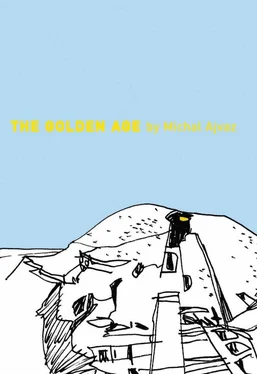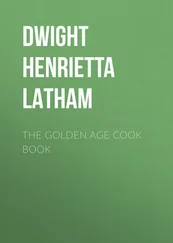Michal Ajvaz - The Golden Age
Здесь есть возможность читать онлайн «Michal Ajvaz - The Golden Age» весь текст электронной книги совершенно бесплатно (целиком полную версию без сокращений). В некоторых случаях можно слушать аудио, скачать через торрент в формате fb2 и присутствует краткое содержание. Год выпуска: 2010, Издательство: Dalkey Archive Press, Жанр: Современная проза, на английском языке. Описание произведения, (предисловие) а так же отзывы посетителей доступны на портале библиотеки ЛибКат.
- Название:The Golden Age
- Автор:
- Издательство:Dalkey Archive Press
- Жанр:
- Год:2010
- ISBN:нет данных
- Рейтинг книги:4 / 5. Голосов: 1
-
Избранное:Добавить в избранное
- Отзывы:
-
Ваша оценка:
- 80
- 1
- 2
- 3
- 4
- 5
The Golden Age: краткое содержание, описание и аннотация
Предлагаем к чтению аннотацию, описание, краткое содержание или предисловие (зависит от того, что написал сам автор книги «The Golden Age»). Если вы не нашли необходимую информацию о книге — напишите в комментариях, мы постараемся отыскать её.
is Michal Ajvaz’s greatest and most ambitious work.
The Golden Age
The Golden Age — читать онлайн бесплатно полную книгу (весь текст) целиком
Ниже представлен текст книги, разбитый по страницам. Система сохранения места последней прочитанной страницы, позволяет с удобством читать онлайн бесплатно книгу «The Golden Age», без необходимости каждый раз заново искать на чём Вы остановились. Поставьте закладку, и сможете в любой момент перейти на страницу, на которой закончили чтение.
Интервал:
Закладка:
Some inhabitants of the upper town distributed the water around their houses by a system of narrow gutters that trailed across the ceilings; the water would flow over the sides of the gutters, thus creating walls of water inside the house, too. The rooms in such houses would be separated from one another by nothing but these cool, translucent walls. The water would be drained from the house by channels in the floor. These half-transparent walls breathed out an exhilarating coolness even on the hottest nights, but they long made me feel uncomfortable as naturally they granted those who lived within them no privacy; behind the wall to a neighbouring room, objects and bodies appeared as deformed and imprecise shapes. I was taken aback that the islanders had no difficulty in performing the most intimate acts behind transparent walls, even when the room beyond the wall of water was full of people.
When I complained about this to Karael she did not understand why I was bothered by it. She said that nobody really saw us, that the people beyond the wall of water watched only the quivering shapes on the wall’s surface, and although these resembled us a little, there were all kinds of things which resembled us, certain other people, for example, or our own shadows and pictures and photographs of us, and we did not identify ourselves with these things. I understood later that the islanders’ perception of images on walls of water and reflections in the mirror is different from ours: they look at them as at independent objects that bear a certain relation to what is behind the wall of water or in front of the mirror, but this relation is no more remarkable than relations that exist among all things.
For the islanders the real presence of a thing was enough. For them shape and colour had an intrinsic longing to create a glowing carpet, and our gaze did them a great injustice by forcing them to become components of things, by attaching to them all kinds of doubtful phantom interiors and unverifiable backs; it seemed to the islanders an inexcusable impropriety to dispose of colours and shapes so that they represented other, remote things. When after my departure Karael telephoned me from the booth on the jetty, I had the impression she did not identify fully the voice in the sun-heated receiver with the foreigner she had known on the island.
The islanders did not bind images and reflections to things; they set them free, granted them lives of independence. I think they understood the relations between things and images as two-sided, believing that the shapes and motions of figures originated too in what took place on the surfaces of mirrors and bodies of water. On the island things and their images and images and their things conducted similar dialogues to those which existed between things and names. I observed that some of Karael’s gestures and the agitated play of her fingers probably had their beginnings in the quivering images on the wall of water, that from the time she obtained an octagonal mirror of green glass, an olive tinge appeared in her dusky complexion. (I wouldn’t like to speculate on whether this phenomenon was caused by the mirror’s drawing my attention to something that had been there all along, whether the colour of Karael’s skin changed as a consequence of a psychosomatic process, or whether there exists in obscurity some kind of mirror sorcery.)
When I was on the island I, too, gradually learned not to make too great a distinction between things and images, while the imitation of images by things seemed to me a truly banal phenomenon. Regrettably this inability to defend myself against the power of images has stayed with me: for example, I come home late at night and see in the hallway mirror that my face resembles the dim reflection in the window of the empty night tram; I see etched in my features a hint of the dark facades of the houses that passed by my face when I was on the tram. You would never get me into the labyrinth of crooked mirrors on Petřín Hill.
Labyrinths, mirrors, precious stones
The walls of water had one more purpose: they served as clocks. On flowing into a house, water would enter a receptacle in which there was a cylinder composed of twenty-four layers. Each layer was made up of a dense aromatic essence, and the water which flowed through the receptacle dissolved one layer every hour. In this way the walls of water always expelled the fragrance of the hour so that in their every waking moment the inhabitants of the upper town knew what time it was. I found this particularly pleasant at night. Whenever I awoke in the middle of the night, the damp air would be replete with, let us say, the scent of vanilla and I would say to myself, “It is only two o’clock, I may sleep for a long time yet.” Or else I would smell oranges and know that daybreak was at hand. Even today in my Prague flat sometimes I stir in the night and, neither asleep nor fully awake, sniff the air to determine the time, at which point the smells of the city break into my reverie through the half-open window. And I ask myself what strange hour is this before my disquiet wakes me properly and it dawns on me where I am.
How happy I would be if these lines of mine inspired someone to start producing aromatic clocks! I am convinced that it would not be too difficult. There is many a sleeper who awakes to the darkness, to be smothered in the formless matter of the night so that he cannot breathe; there is a soggy, amorphous mass on top of him, and the sight of the glowing face of his watch cannot save him as the black, liquid mud that stuffs itself into his lungs, ears and brain, refuses to have anything to do with phosphorescent numerals. But the night would be powerless to resist a scent effusing in the darkness, washing into all its bays; it would have to capitulate to this amicable foe, this kindly victor, to accept the segmentation the scent was offering, to submit to the bleary but precise arithmetic. Thus would the night lose its power over the wakeful, allowing them to return to the realm of sleep, of their desires.
The water flowing out of the lake above the town was divided into several arms that divided and frayed further until in several places — on tables of rock, in the moss, in the depths of a house — the current transformed itself into a fine capillary net before the strands were gathered together again. I would often study the places where the river dissolved almost to nothing; here were labyrinths of tiny, barely visible, dissipating threads of water, zigzagging, dripping, oozing underbeds, which rose and receded and evaporated. It seemed incredible to me that a flow of water which above the town and down on the plain moved in orderly fashion in a single direction and despite the shallowness of its basin earned the designation of river in every season of the year, should now and then transform itself into this tangled web that verged on nothingness. It seemed to me that by these muddled and fading movements it revealed its true nature, the well-concealed secret of its unity and calm. The capillary labyrinth was at the heart of the double delta that spread through the town, the secret heart of the river as a whole.
The rooms of the apartments of both towns had practically no furniture, although the inhabitants of the upper town had a liking for mirrors, which made up a large proportion of the cargoes which came to the island by ship. On the walls of stone and water of the upper town there were mirrors small and large, oval, round and rectangular, in which was reflected the maze of arms of the double delta, which itself was like a mirror image. In these mirrors the labyrinth was multiplied, it gathered to its arms new braids; it seemed as though some of the currents flowed into a dark sea concealed in the depths of the mirrors, while others rose from dreamlike sources in the mirrors and gradually acquired substantiality as they went on their way. Waters that dissipated in the mirrors were constantly replaced by currents that flowed into reality from the world of reflected images.
Читать дальшеИнтервал:
Закладка:
Похожие книги на «The Golden Age»
Представляем Вашему вниманию похожие книги на «The Golden Age» списком для выбора. Мы отобрали схожую по названию и смыслу литературу в надежде предоставить читателям больше вариантов отыскать новые, интересные, ещё непрочитанные произведения.
Обсуждение, отзывы о книге «The Golden Age» и просто собственные мнения читателей. Оставьте ваши комментарии, напишите, что Вы думаете о произведении, его смысле или главных героях. Укажите что конкретно понравилось, а что нет, и почему Вы так считаете.












